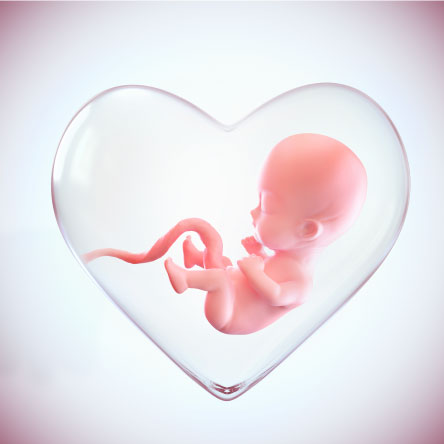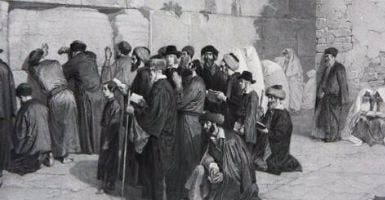Shemot 5780
And the king of Egypt said to the Jewish midwives, one of whom was called Shifra, and the other of whom was called Puah. And he said, “When you deliver the babies for the Jewish women and you see them on the birth-stool, if it is a son you are to kill him but if it is a daughter, she shall live”. (Shemos 1:15-16)
Termination of pregnancy is one of the common ethical dilemmas that arises in the practice of medicine. Although there may be maternal or fetal medical concerns leading to consideration of abortion (e.g. if the mother’s life is threatened by the pregnancy or the fetus has severe congenital anomalies), sometimes the pregnancy may just be undesired. How should a doctor conduct himself when the abortion is not warranted from a medical perspective?[1]
If the woman in question is a Bas Yisrael, the doctor must seek appropriate Halachic guidance. What if the woman is a Bas Noach – what are her obligations regarding her unborn child and what are the obligations of the person guiding her in her decision?
The basis for this discussion is the Gemara in Sanhedrin (57b):
They said in the name of R’ Yishmael, [a Ben Noach is put to death] even for [the murder of] fetuses. What is the reasoning of R’ Yishmael? It says in the Pasuk, “Shofech Dam haAdam ba’Adam Damo Yishofeich” (“Whoever sheds the blood of man, by man shall his blood be shed”). Which being can be described as being “ba’Adam” (literally, “inside of man”) – a fetus in its mother’s womb.
The law that killing a fetus warrants the death penalty is specific to Bnei Noach. For a Yisrael, killing a fetus is not punishable by death[2]. The Rishonim in Maseches Sanhedrin (ad. loc.)[3], explain that a fetus does not have the status of a “Nefesh” for which a Yisrael is liable for murder.
The Moshav Zekeinim[4] in our Parsha question the assertion made by Rashi that the Jewish midwives, Shifra and Puah, were none other than Yocheved and Miriam. Why would the Torah need to tell us that these two righteous women refused to obey Paroh and kill innocent baby boys? They contend that these were in fact non-Jewish midwives! However, the Maharsha in Sanhedrin (ad. loc.)[5] argues that, in fact, Paroh specifically wanted the murder of the baby boys to be performed by the Jewish midwives for he knew that a Ben Noach is liable to the death penalty for killing a fetus whereas a Yisrael is not. Therefore, he attempted to enlist Yocheved and Miriam for the task!
Tosfos (Chulin 33a) rule that although a Yisrael is not liable to the death penalty for killing a fetus, it is nevertheless an Issur d’Oraisa. (Rav Asher noted that according to the aforementioned Maharsha one would have to say that Paroh was unaware of this, else he would not have attempted to enlist Yocheved and Miriam to kill the baby boys. Alternatively, while he knew that it is an Issur d’Oraisa, a Yisrael would not be obligated to give up his life rather than violate it. Therefore, since Paroh was threatening the Jewish midwives with death if they did not comply with his decree, they would have been permitted to carry it out.)
May a Jewish doctor participate in (or even advise) an abortion for a Ben Noach? In general, it is forbidden to aid a person in committing a sin as the Torah (Vayikra 19:14) says, “Before a blind man you shall not place a stumbling block” (“Lifnei Iveir”). This prohibition also applies to aiding a Ben Noach to sin[6]. However, a person only violates Lifnei Iveir if the other party would have been unable to sin without his assistance (“Trei Ivrei d’Nahara” – “two sides of a river” – see footnote[7]). Therefore, the Maharit (1:97) rules that while it is forbidden for a Jewish doctor to advise or aid in an abortion of a Ben Noach when there is no other doctor to perform the procedure, if there are other doctors who would do so, there is no longer a concern of Lifnei Iveir since it isn’t considered Trei Ivrei d’Nahara.[8]
The Tzitz Eliezer (9:51, Sha’ar 3:2) cites the Maharit and other Poskim who also discuss the question of abortion of a Ben Noach. He rules that generally one must be more stringent with a Ben Noach who is liable to the death penalty for killing a fetus, and certainly when the fetus poses no danger to the mother. He also concludes, based on the concepts outlined above, that in cases where one may perform the abortion, it is better that a Yisrael perform it rather than a Ben Noach.
The Poskim also consider several other cases where there may be a difference between a Yisrael and a Ben Noach:
- Aborting a Fetus of a Ben Noach when Fewer than Forty Days have Passed since Conception:
There is a dispute among the Poskim whether the prohibition for a Ben Noach to kill a fetus applies when fewer than forty days have passed since conception. In our essay for Parshas Noach 5780, we discussed at length how there is a broad discussion among the Poskim whether a fetus at this early stage is “merely water” (“Maya be’Alma”) and therefore of even lesser status than a fetus at a later stage (which is also not considered a “Nefesh” as stated above). Most Poskim rule stringently and forbid abortion of a Jewish fetus less than 40 days old, unless there are other reasons to permit it.
However, regarding a fetus of a Ben Noach, there are some who rule leniently. As mentioned, the source for the prohibition of a Ben Noach to kill a fetus is the Pasuk, “Shofech Dam haAdam ba’Adam Damo Yishofeich”. Therefore, the only consideration in determining whether one may kill the fetus, is whether it is considered an “Adam” and not whether it has “Chiyus” (life) or if it is a “Nefesh”. For this reason, the Achiezer (3:65) and Toras Chesed[9] (E.H. 42) contend that one may perform an abortion of a fetus of Ben Noach that is fewer than forty days old because it certainly cannot be considered to be an “Adam” at that early stage[10].
This conclusion is not unanimous among the Poskim. Rav Moshe Shternbuch Shlit”a (Teshuvos v’Hanhagos 2:735) notes that there is no prohibition of Lifnei Iveir in any case that is a Machlokes haPoskim, (Ritva, Avodah Zarah 15b). Therefore, everybody would agree that a doctor may advise or assist a Ben Noach to abort a fetus that is fewer than forty days old.
- When the Mother is in Danger
The Mishna in Oholos (7:6) rules categorically that when a fetus endangers the life of its mother, it must be aborted in order to save her life. However, if the majority of its body has already emerged, one may not kill it for “Ein Dochin Nefesh Mipnei Nefesh” – “we do not set aside one soul on account of another”.
There is extensive discussion in the Rishonim and Acharonim (based on the Gemara in Sanhedrin 72b) as to the distinction between a fetus that has already been born (because most of its body has emerged) and that which hasn’t. In both cases one could consider the fetus to be a “Rodef” (a pursuer who is threatening the life of another and may be killed) – why then is it not always permitted to kill it? The discussion is beyond the scope of this essay, but what is certainly clear is that a fetus that has not been born does not have an equal status to its mother. One may therefore “set aside” its life in order to save the mother[11].
Our discussion thus far relates only to Dinei Yisrael, but does the same apply to a Ben Noach? The Poskim argue that this may depend upon two answers of Tosfos in Sanhedrin (59a, s.v. Leka). The Gemara asserts that, “there is nothing that is forbidden to a Ben Noach but permitted to a Yisrael”[12]. Tosfos ask that in a case where an unborn fetus is putting its mother at risk, the Halacha, as mentioned above, is that one kills the fetus to save the mother. But this would surely not be the case regarding a Ben Noach who is forbidden to kill a fetus[13]. If so, we do have a case where something is forbidden for a Ben Noach yet permitted for a Yisrael!
Tosfos offer two answers. Their first answer is that, “in a case of a Yisrael there is a Mitzva to save the life (of the mother)” In other words, since there is an obligation to save the life of the mother, we set aside the general rule that “there is no stringency of a Ben Noach over a Yisrael”.
Tosfos’ second answer is that, “perhaps it is even permitted in the case of a Ben Noach”. In other words, the assumption that it would be forbidden for a Ben Noach to kill a fetus in order to save the mother is incorrect. Tosfos haRosh explains that this is because a fetus of a Ben Noach is also not considered to be a “Nefesh”, just like a fetus of a Yisrael. Therefore, while the prohibition for a Ben Noach to kill a fetus is extremely stringent, nevertheless one may kill it because its mother’s life takes precedence.
The tendency of the Poskim is to apply the second answer of Tosfos. Therefore, in cases where the mother’s life is in danger, one may perform an abortion even for a Bnei Noach[14]. Some explain that this is because the reason that it is generally forbidden (i.e. “Yehareg v’Al Ya’avor”) to perform an act of murder in order to avoid being killed is because one person’s blood is no “redder” than another’s. However, in this case we know that it is more severe for a Jew to murder a living human being than a fetus, so the mother’s life does take precedence (her blood is “redder”). Therefore, there are grounds for acting similarly with a Ben Noach.
However, the position of Rav Shternbuch (Teshuvos v’Hanhagos ibid.) is that one should be stringent in line with the first answer of Tosfos. Therefore, even where civil law permits abortion, a non-Jew is liable for the death penalty according to Torah law even if the mother’s life is at risk, as there is no law of Pikuach Nefesh for a Ben Noach[15]. Rav Shternbuch therefore rules that a Jewish doctor should not sign an order for an abortion for a Ben Noach, even where there is a danger posed to the mother.
The Minchas Avraham[16] (42) offers a novel ruling. He maintains that even if we maintain that we would set aside even Torah laws to save the life of the mother since there is a Din of Pikuach Nefesh for Bnai Noach, this would only apply to a definite (“Vadai”) case of Pikuach Nefesh. This is based on Tosfos in Sanhedrin (75a, s.v. v’Im) that the law of Pikuach Nefesh for a Ben Noach would logically apply to a Ben Noach even though the Pasuk of “v’Chai Bahem” (the source for the law of Pikuach Nefesh) does not apply to them. However, where the danger to the mother is in doubt (“Safeik Pikuach Nefesh”) one may not be lenient and perform an abortion for a Ben Noach. Since the Pasuk of “v’Chai Bahem” (Yoma 86a) is the source that even Safeik Pikuach Nefesh overrides all of the laws of the Torah, and it is not something that can be derived logically, it only applies to a Yisrael, not a Ben Noach.
[1] In our essay to Parshas Shemos 5779 we discussed the broader question of how a doctor should conduct himself when the laws of the country demand that he violate halacha. Among the questions, we examined whether a doctor (such as an anesthesiologist or surgeon) can participate in an abortion and cited the rulings of Rav Shlomo Zalman Auerbach zt”l and haGaon Rav Asher Weiss Shlit”a at length. This essay serves to complete that discussion and examine a number of more specific questions. The archive of Divrei Torah can be found at https://www.medicalhalacha.org/torah-archive.
[2] This Halacha is cited by the Rambam (Hilchos Melachim 9:4)
[3] See our essay for Parshas Noach 5780.
[4] A compendium of the commentaries of the Ba’alei haTosfos al haTorah
[5] Cited by haGaon Rav Asher Weiss Shlit”a in Minchas Asher, Shemos 2.
[6] See Avodah Zara 6b
[7] The classic example used to illustrate this is a Nazir, who is prohibited to drink wine, on one side of a river without access to wine. Lifnei Iveir forbids passing wine – that he could not reach on his own – across the river to the Nazir. This Halacha is exceedingly complex and further discussion is beyond the scope of this essay.
[8] There are a number of different versions of the text of this section of the Maharit. We have cited it as it is understood by many Poskim, including the Tzitz Eliezer that will be cited below.
[9] R’ Shneur Zalman Friedkin of Lublin (1830-1902), a Talmid Muvhak of the Tzemach Tzedek of Lubavitch
[10] See also the Igros Moshe (C.M. 2:89).
[11] See next footnote.
[12] This rule is the reason why we were certain that there is also an Issur d’Oraisa for a Yisrael to kill a fetus for else, there would be something forbidden for a Ben Noach and permitted to a Yisrael.
[13] Tosfos’ question seems to be predicated on the assumption that the abortion of an unborn fetus is less severe for a Yisrael than the murder of a living human, not that the mother has greater standing than her unborn child. Therefore, when it comes to a Ben Noach, since the acts of abortion and homicide are equally severe, it should be forbidden to kill the fetus in order to save the mother. However, they may be two sides of the same coin, as the fact that the Torah views the killing of a fetus of a Ben Noach more severely indicates that the status of the mother and the fetus is equal. See the Minchas Chinuch (296) who discusses whether the status of the mother and the fetus is equal in Bnai Noach and abortion is forbidden because it is murder, or if the fetus in fact has a lesser status than the mother and the prohibition of abortion is a separate prohibition than the general prohibition of murder.
[14] See Nishmas Avraham (C.M. 425:3)
[15] See below where we will see that this assumption is far from clear.
[16] R’ Avraham Reinhold of Cracow (c.1880-c.1943)















Add comment